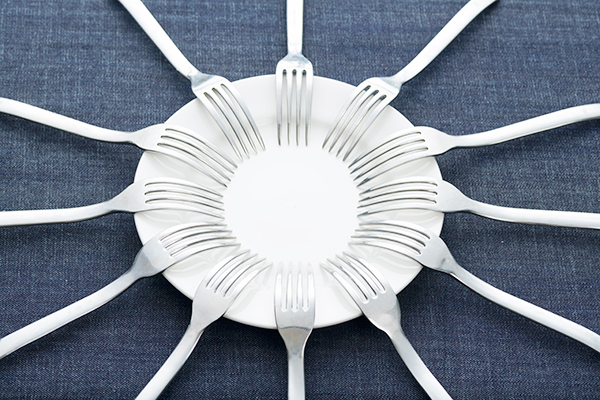There are so many different recommendations for what to eat and what not to eat. Open up a newspaper and it wouldn’t be surprising to see a headline highlighting the risks associated with too much or too little of a given type of food.
Research is ongoing, and the idea of what constitutes a ‘perfect diet’ will arguably change over time in response to that research. However there are some things that are clear: a healthy diet can help prevent NCDs (non-communicable diseases), there are some basic principles to follow, and too many of us are not currently following them. Many people in the UK are eating too many calories.
That being said, there are ways of thinking about how and what we eat (the ‘practice’ of eating) so that we don’t feel deprived, and feel even more nourished by our diet.
Mindless eating and moral licensing
Think about the last time you ate. What else were you doing – were you checking your emails, watching TV, reading the newspaper, driving? Studies by food psychologist Brian Wansink have found that often we eat as a secondary activity, in other words, we might eat in front of the TV, at our desks, or in the car. This is important because it means that we often eat ‘mindlessly’, without paying attention to the experience of tasting the food, feeling its texture, and noticing the sensation of satiating our hunger.

We can therefore overeat in response to social norms or other cues such as plate size or food variety which suggest a ‘normal’ or ‘reasonable’ amount to eat. For example, bigger bowls or squatter glasses lead us to both serve more and to eat more, as does greater variety of foods — even if the variety is just in colour and not in taste (for example multi-coloured M&M’S).
Additionally, Wansink and colleagues find that we tend to underestimate the amount of calories we actually eat, especially when food is labelled as healthier. This matters, because we might overcompensate by eating more. For example, LSE researchers Paul Dolan and Matteo Galizzi found a permitting spillover effect, or ‘moral licensing’, whereby after people exercise they tend to eat additional calories. In essence, because we feel good about a virtuous behaviour such as exercising or eating a low-calorie meal, we may give ourselves license to indulge later on, sometimes so much that it cancels out the effects of the initial desired behaviour.
So what to do?
One approach to address mindless eating is to redesign our homes and eating environments so that we mindlessly eat less. Wansink explains that if we cut more than 100 calories per day, we will probably notice the change and feel deprived. If we feel deprived, it is less likely that the change to diet will be sustained. His suggestion is to try to shave calories by just under that amount so that the change goes unnoticed, and we can ‘mindlessly’ lose weight. It may sound surprising, but one study found that simply using smaller 10-inch plates for dinner led to average monthly weight loss of nearly 2 lbs.

Another approach is to become more mindful and make deliberate efforts to enjoy the experience of eating. The more mindful we are when we eat and drink, the more likely we will be to respond to internal cues such as no longer being hungry or food no longer tasting as good, as opposed to simply responding to external cues like our plate being empty or the television show being over.
Taking the mindful approach may also address the point about deprivation. It seems unlikely that we will feel deprived when we are more fully engaged in the experience of eating, paying attention to the flavours and textures, and truly appreciating the nourishing value of our meals.
This article is an edited excerpt from the RSA report Easier Said than Done: why we struggle with healthy behaviour and what to do about it.

Be the first to write a comment
Comments
Please login to post a comment or reply
Don't have an account? Click here to register.